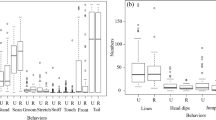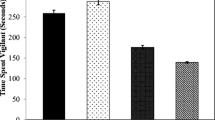Abstract
Conspecific aggressiveness often increases after social isolation for species that are not entirely solitary, and this increased aggression could also be reversed after resocialization. However, literature on this aggression plasticity refers to either permanently social or low-level subsocial species in invertebrates. Examinations of conspecific aggressiveness reversibility in high-level subsocial invertebrates, in which offspring cohabitate with parents for a certain period of time after sexual maturation, would enhance the understanding of the role of conspecific-aggression plasticity in social evolution. Here, using the lactating spider Toxeus magnus, which exhibits extremely high-level subsociality, we assessed three questions. (1) Is its conspecific aggression affected by social living and/or kinship? The results indicated that conspecific aggression increased after social isolation, while kinship did not affect aggressiveness. (2) Could the social-isolation-induced higher aggression be reversed after resocialization? The results showed that the increased aggression of the spiders could be reversed 3 days after resocialization. (3) What is the proximate mechanism that caused the aggression reversibility by resocialization? A simulated resocialization experiment in which single spider was provided with mirrors demonstrated that the visual cues of conspecifics alone could reverse the aggression after 6 days. These results indicate that the high-level subsocial invertebrate showed aggressiveness reversibility without chemical cues. This is more similar to permanently social species rather than to low-level subsocial species, and visual cues could be vital to induce aggression change. These results suggest that conspecific-aggression reversibility might play a key role in social evolution and may functionally enhance species’ adaptiveness under variable conditions.



Similar content being viewed by others
Data availability
The dataset analyzed during the current study is available in the Supplementary Information.
Code availability
Please contact the authors for the statistical analyses code.
References
Agnarsson I, Avilés L, Coddington JA, Maddison WP (2006) Sociality in theridiid spiders: repeated origins of an evolutionary dead end. Evolution 60:2342–2351. https://doi.org/10.1111/j.0014-3820.2006.tb01869.x
Archer J (1988) The behavioural biology of aggression. Cambridge University Press, Cambridge
Bates D, Mächler M, Bolker B, Walker S (2015) Fitting linear mixed-effects models using lme4. J Stat Softw 1:1–48. https://doi.org/10.18637/jss.v067.i01
Bilde T, Lubin Y (2001) Kin recognition and cannibalism in a subsocial spider. J Evol Biol 14:959–966. https://doi.org/10.1046/j.1420-9101.2001.00346.x
Cerveira AM, Jackson RR, Nelson X (2019) Dim-light vision in jumping spiders (Araneae, Salticidae): identification of prey and rivals. J Exp Biol 222:jeb198069. https://doi.org/10.1242/jeb.198069
Chen ZQ, Corlett RT, Jiao XG, Liu SJ, Charles-Dominique T, Zhang SC, Li H, Lai R, Long CB, Quan RC (2018) Prolonged milk provisioning in a jumping spider. Science 362:1052–1055. https://doi.org/10.1126/science.aat3692
Chiara V, Portugal FR, Jeanson R (2019) Social intolerance is a consequence, not a cause, of dispersal in spiders. PLoS Biol 17:e3000319. https://doi.org/10.1371/journal.pbio.3000319
Creel S, Dantzer B, Goymann W, Rubenstein DR (2013) The ecology of stress: effects of the social environment. Funct Ecol 27:66–80. https://doi.org/10.1111/j.1365-2435.2012.02029.x
Dloniak SM, French JA, Holekamp KE (2006) Rank-related maternal effects of androgens on behaviour in wild spotted hyaenas. Nature 440:1190–1193. https://doi.org/10.1038/nature04540
Dong B, Quan R-C, Chen Z-Q (2019) Prolonged milk provisioning and extended maternal care in the milking spider Toxeus magnus: biological implications and questions unresolved. Zool Res 40:241–243. https://doi.org/10.24272/j.issn.2095-8137.2019.041
Dyble M, Houslay TM, Manser MB, Clutton-Brock T (2019) Intergroup aggression in meerkats. Proc R Soc B 286:20191993. https://doi.org/10.1098/rspb.2019.1993
Fattebert J, Perrig M, Naef-Daenzer B, Grüebler MU (2019) Experimentally disentangling intrinsic and extrinsic drivers of natal dispersal in a nocturnal raptor. Proc R Soc B 286:20191537. https://doi.org/10.1098/rspb.2019.1537
Field J, Gonzalez-Voyer A, Boulton RA (2020) The evolution of parental care strategies in subsocial wasps. Behav Ecol Sociobiol 74:78. https://doi.org/10.1007/s00265-020-02853-w
Forster GL, Watt MJ, Korzan WJ, Renner KJ, Summers CH (2005) Opponent recognition in male green anoles, Anolis carolinensis. Anim Behav 69:733–740. https://doi.org/10.1016/j.anbehav.2004.06.026
Friard O, Gamba M (2016) BORIS: a free, versatile open-source event-logging software for video/audio coding and live observations. Methods Ecol Evol 7:1325–1330. https://doi.org/10.1111/2041-210X.12584
Frommen JG (2020) Aggressive communication in aquatic environments. Funct Ecol 34:364–380. https://doi.org/10.1111/1365-2435.13482
Furey RE (1998) Two cooperatively social populations of the theridiid spider Anelosimus studiosus in a temperate region. Anim Behav 55:727–735. https://doi.org/10.1006/anbe.1997.0648
Gelman A, Su Y, Yajima M, Hill J, Pittau M, Kerman J, Zheng T Dorie V (2016) Arm: data analysis using regression and multilevel/hierarchical models. R Package Version 1.10-1. https://cran.r-project.org/web/packages/arm/. Accessed 21 May 2021
Golla W, Hofer H, East ML (1999) Within-litter sibling aggression in spotted hyaenas: effect of maternal nursing, sex and age. Anim Behav 58:715–726. https://doi.org/10.1006/anbe.1999.1189
Gómez-Laplaza LM, Morgan E (2000) Laboratory studies of the effects of short-term isolation on aggressive behaviour in fish. Mar Freshw Behav Physiol 33:63–102. https://doi.org/10.1080/10236240009387083
Gundermann JL, Horel A, Krafft B (1993) Experimental manipulations of social tendencies in the subsocial spider Coelotes terrestris. Insectes Soc 40:219–229. https://doi.org/10.1007/BF01240709
Kim KW, Krafft B, Choe JC (2005) Cooperative prey capture by young subsocial spiders: II behavioral mechanism. Behav Ecol Sociobiol 59:101–107. https://doi.org/10.1007/s00265-005-0014-y
Kravitz EA, de la Fernandez Paz M (2015) Aggression in Drosophila. Behav Neurosci 129:549–563. https://doi.org/10.1037/bne0000089
Krieger J, Breer H (1999) Olfactory reception in invertebrates. Science 286:720–723. https://doi.org/10.1126/science.286.5440.720
Kuznetsova A, Brockhoff PB, Christensen RHB (2017) lmertest package: tests in linear mixed effects models. J Stat Softw 1:1–26. https://doi.org/10.18637/jss.v082.i13
Lagerspetz KMJ, Sandnabba K (1982) The decline of aggressiveness in male mice during group caging as determined by punishment delivered by the cage mates. Aggressive Behav 8:319–334. https://doi.org/10.1002/1098-2337(1982)8:4%3c319::AID-AB2480080402%3e3.0.CO;2-1
Larson ET, O’Malley DM, Melloni RH (2006) Aggression and vasotocin are associated with dominant–subordinate relationships in zebrafish. Behav Brain Res 167:94–102. https://doi.org/10.1016/j.bbr.2005.08.020
Laursen L, Bekoff M (1978) Loxodonta africana. Mamm Species. https://doi.org/10.2307/3503889
Lesne P, Trabalon M, Jeanson R (2016) Cannibalism in spiderlings is not only about starvation. Behav Ecol Sociobiol 70:1669–1678. https://doi.org/10.1007/s00265-016-2172-5
Lubin Y, Bilde T (2007) The evolution of sociality in spiders. Adv Study Behav 37:83–145. https://doi.org/10.1016/S0065-3454(07)37003-4
Miczek KA, de Boer SF (2005) Aggressive, defensive, and submissive behavior. In: Wishaw IQ, Kolb B (eds) The behaviour of the laboratory rat: a handbook with tests. Oxford University Press, New York
Miczek KA, Maxson SC, Fish EW, Faccidomo S (2001) Aggressive behavioral phenotypes in mice. Behav Brain Res 125:167–181. https://doi.org/10.1016/S0166-4328(01)00298-4
Oliveira RF, Silva JF, Simões JM (2011) Fighting zebrafish: characterization of aggressive behavior and winner-loser effects. Zebrafish 8:73–81. https://doi.org/10.1089/zeb.2011.0690
Osorno JL, Drummond H (2003) Is obligate siblicidal aggression food sensitive? Behav Ecol Sociobiol 54:547–554. https://doi.org/10.1007/s00265-003-0667-3
Palanza P, Della Seta D, Ferrari PF, Parmigiani S (2005) Female competition in wild house mice depends upon timing of female/male settlement and kinship between females. Anim Behav 69:1259–1271. https://doi.org/10.1016/j.anbehav.2004.09.014
Parthasarathy B, Somanathan H (2020) When and why do sit-and-wait social spiders disperse? Israel J Ecol Evol 66:15–25. https://doi.org/10.1163/22244662-20191068
Peeke HVS, Twum M, Finkelstein JE, Figler MH (1995) Maternal aggression in red swamp crayfish (procambarus clarkii, girard): the relation between reproductive status and outcome of aggressive encounters with male and female conspecifics. Behaviour 132:107–125. https://doi.org/10.1163/156853995X00324
Pfennig DW (1999) Cannibalistic tadpoles that pose the greatest threat to kin are most likely to discriminate kin. Proc R Soc B 266:57–61. https://doi.org/10.1098/rspb.1999.0604
Pourié G, Trabalon M (1999) Agonistic behaviour of female Tegenaria atrica in the presence of different aged spiderlings. Physiol Entomol 24:143–149. https://doi.org/10.1046/j.1365-3032.1999.00124.x
Pourié G, Trabalon M (2001) Plasticity of agonistic behaviour in relation to diet and contact signals in experimentally group-living of Tegenaria atrica. Chemoecology 11:175–181. https://doi.org/10.1007/PL00001849
Prokopy RJ, Roitberg BD (2001) Joining and avoidance behavior in nonsocial insects. Annu Rev Entomol 46:631–665. https://doi.org/10.1146/annurev.ento.46.1.631
Pruitt JN, Avilés L (2018) Social spiders: mildly successful social animals with much untapped research potential. Anim Behav 143:155–165. https://doi.org/10.1016/j.anbehav.2017.08.015
R Core Team (2017) R: A language and environment for statistical computing. R Foundation for Statistical Computing, Vienna, Austria. https://www.R-project.org/. Accessed 25 Apr 2020
Rypstra AL (1986) High prey abundance and a reduction in cannibalism: the first step to sociality in spiders (arachnida). J Arachnol 14:193–200
Schneider JM, Bilde T (2008) Benefits of cooperation with genetic kin in a subsocial spider. Proc Natl Acad Sci USA 105:10843. https://doi.org/10.1073/pnas.0804126105
Shukla S, Pareek V, Gadagkar R (2014) Ovarian development in a primitively eusocial wasp: social interactions affect behaviorally dominant and subordinate wasps in opposite directions relative to solitary females. Behav Processes 106:22–26. https://doi.org/10.1016/j.beproc.2014.04.003
Stevenson PA, Rillich J (2013) Isolation associated aggression—a consequence of recovery from defeat in a territorial animal. PLoS One 8:e74965. https://doi.org/10.1371/journal.pone.0074965
Sturgis SJ, Gordon D (2012) Nestmate recognition in ants (hymenoptera: formicidae): a review. Myrmecol News 16:101–110
Svare B, Gandelman RJH, Behavior. (1973) Postpartum aggression in mice: experiential and environmental factors. Horm Behav 4:323–334. https://doi.org/10.1016/0018-506X(73)90032-9
Trivers RL (1974) Parent-Offspring Conflict. Am Zool 14:249–264. https://doi.org/10.1093/icb/14.1.249
Velasco AC, Ferrer ES, Sanz JJ (2021) Conspecific aggression strategies are conditioned by environmental, social and intrinsic variables in breeding blue tits Cyanistes caeruleus. Behaviour. https://doi.org/10.1163/1568539X-bja10111
Yip EC, Rayor LS (2014) Maternal care and subsocial behaviour in spiders. Biol Rev 89:427–449. https://doi.org/10.1111/brv.12060
Acknowledgments
We thank two anonymous reviewers, Xiaoguo Jiao, Gang Wang, Xin Yao, Yan Wang, Teng-Xiang Wang, Yu-Xuan Mo and Qiuyu Jiang, for suggestions, Chu Jiang, Qin Li, Hai-Qiong Shi and Lili Sun for experimental assistance, and the Central Laboratory and Horticulture Department at XTBG for spider collection and maintenance.
Funding
This work was supported by the National Natural Science Foundation of China (No. 31970425) and Natural Science Foundation of Yunnan Province, China (No. 202001AV070013).
Author information
Authors and Affiliations
Contributions
ZC, RCQ, and BD conceived the project and designed experiments; BD and ZC performed research; BD and JXL analyzed data. BD collected data, BD and ZC wrote the original manuscript. ZC, RCQ and JXL revised manuscripts and figures.
Corresponding author
Ethics declarations
Conflict of interest
The authors declare no conflicts of interests or competing interests.
Ethics approval
This research was approved by the Horticulture Department of Xishuangbanna Tropical Botanical Garden, Chinese Academy of Sciences.
Consent to participate
Not applicable.
Consent for publication
Not applicable.
Additional information
Publisher's Note
Springer Nature remains neutral with regard to jurisdictional claims in published maps and institutional affiliations.
Supplementary Information
Below is the link to the electronic supplementary material.
Supplementary file1 (MP4 1803 kb)
Supplementary file2 (MP4 1734 kb)
Rights and permissions
About this article
Cite this article
Dong, B., Liu, JX., Quan, RC. et al. Mirror image stimulation could reverse social-isolation-induced aggressiveness in the high-level subsocial lactating spider. Anim Cogn 25, 1345–1355 (2022). https://doi.org/10.1007/s10071-022-01618-4
Received:
Revised:
Accepted:
Published:
Issue Date:
DOI: https://doi.org/10.1007/s10071-022-01618-4




